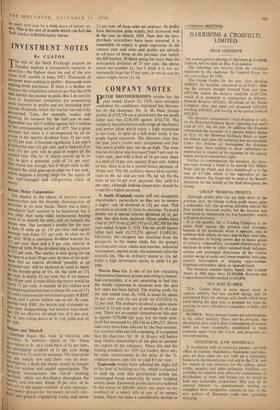INVESTMENT NOTES
By CUSTOS THE end of the Stock Exchange account on Tuesday marked a tremendous turnover in securities-the highest since the end of the pre- vious 'bull' market in June, 1955. Thousands of investors were cashing in profits: thousands were making fresh purchases. If there is a decline on balance, the temptation comes to say that the 1958 boil market has passed its peak. But I do not be- lieve it. Important companies are announcing some recovery in profits and are increasing their interim dividends, which the market has not fully discounted. Take, for example, MARKS AND SPENCER. Its turnover for the half-year to end- September was £64.7 million against £63.3 million in the corresponding period of 1957. Not a great increase, but when it is accompanied by an in- crease in the interim dividend from 10 per cent. to 124 per cent, it becomes significant. Last year's distribution was 321 per cent. and it looks as if at least 371 per cent. will be paid in respect of the current year. The 5s. 'A' shares moved up Is. to 52s. 10 give a potential yield of 3.6 per cent. This seems low enough, but if 40 per cent. is dis- tributed the yield goes up to close on 4 per cent., which suggests a buying range for the equity of this well-managed and still-growing chain of stores.
British Motor Corporation The market in the shares of BRI I MOTOR CORPORATION saw the feverish churning-over of securities at its most hectic. There was a heavy speculative 'bull' account to be liquidated, but it was clear that some solid institutional buying came in to absorb the sales, and on balance the shares rose. The company's profits for the year to July 31 were up by 120 per cent. and equity
earnings rose from I per cent. to close on 50 Per Cent. With a combined dividend warrant for
121 per cent. final and a 5 per cent. interim in respect of 1958-59 the dividend rate is being taken at 17-1 per cent. The market is now going for an increase to at least 20 per cent, in view of the state- fnent that an interim dividend 'possibly at an increased rate' will be declared as usual in April. At the present price of 13s. 6d. the yield on 171 Per cent, is nearly 6f per cent. but if we assume 'at 20 per cent. is mdre likely the return would be nearly 74 per cent. A transfer of £61 million to a dividend equalisation reserve (twice the cost of 17+ per cent.) enhances the investment quality of BMC snares, and I advise holders not to sell. By corn- ,Ixtrison with BMC the ROVER and STANDARD re- sults were disappointing, but ROOTES were excel- e,nt. On an effective dividend rate of 8 per cent. the 'A' non-voting shares at 5s. lid. yield over 61 kr cent.
Wilkins and Mitchell
), Dealings began this week in mu:Ns AND ,IIMIELL 5s. ordinary shares at 10s. These the' issued at 8s. on a yield basis of 81 per cent., cr'e ' anticipated dividend of 13 per cent. being was over 11 times by earnings. The issue price Put unduly low and there was an over- ubscription. I think the shares should be bought both for income and capital appreciation. The e °111,PanY manufactures the 'Scrvis' washing machines, which are distributed throughout the e intrY and overseas. About 30 per cent. of its tates are in the export markets. It also manufac- tures ti.;.‘ • Power presses for the motor, aircraft, elec- 'Lai and general engineering trades and about 25 per cent. of these sales are overseas. Its profits have fluctuated quite widely, but recovered well in the year to March, 1958. Now that the hire- purchase restrictions have been removed it is reasonable to expect a good expansion in the current year and sales and profits are already in advance of those of the previous year before the HP bonfire. Without going for more than the anticipated dividend of 13 per cent, the shares could rise another Is., but I think it is not un- reasonable to go for 15 per cent., in which case the shares might rise to 12s. 6d.






































 Previous page
Previous page